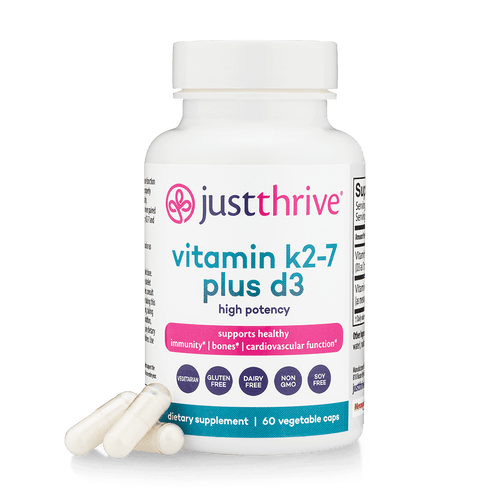Plus the clinically-proven way to keep it running smoothly.
Your immune system is truly fascinating. It protects you against a multitude of threats every day. Some it’s battled before, others that it’s never come across.
And no matter what kind of microbe or toxin is attacking, your immune system will find a way to defeat it.
You probably never notice your immune system until something goes wrong, but it’s there all the time, keeping you safe, and working around the clock.
All it needs in return is support, especially during those times when everyone around you seems to have caught something.
To give your immune system enough of the right support, it helps to know more about it. Here are seven amazing things you may not know about your immune system.
1. The majority of your immune system is in your gut.
Your gut is home to between 70–80% of your immune cells.[1] That makes sense when you think about it: Most of the microbial threats you face come in through your digestive system.[2] So your immune system sets up shop right there, to take out problems before they can attack the rest of your body.
 Want to listen instead of read? CLICK HERE
Want to listen instead of read? CLICK HERE
2. Your immune system doesn’t have one centralized location.
Because your immune system has to protect your whole body, it’s everywhere all at once, with no centralized location. It’s made up of organs, cells, and proteins that team up to take on invaders no matter how they get in. Different pieces of your immune system include:[3]
- Bone marrow
- Lymph nodes and lymphatic vessels
- Spleen
- Tonsils
- Immune cells, like natural killer (NK) cells
- Mucus and mucous membranes
- Protective proteins, like immunoglobulins
3. There are two main parts of immunity: innate and adaptive.
Your immune system has two key parts: innate and adaptive.[4]
You’re born with your innate immune system, and it covers all the basics. It acts as a rapid response system made up of physical barriers—like skin and mucous membranes—that block invaders. When the innate system senses a threat, it calls on special cells called phagocytes to surround and devour them.[5]
The adaptive immune system is more specific, made up of special proteins called antibodies that recognize and target particular germs.[5] Antibodies know exactly how to kill their targets and are able to defeat them more quickly than the innate system.[4]

4. Antibodies are your immune system’s first line of defense.
Whenever your immune system senses a threat, it sends out antibodies, also called immunoglobulins. These front-line fighters are your body’s most important soldiers, going on the attack whenever they come across viruses, infectious bacteria, environmental toxins, fungi, yeast, and allergens.[6] Antibodies latch on to these invaders so they can’t escape, prevent them from penetrating your gut barrier wall, then neutralize them so they can’t cause any damage.
Your body’s primary antibodies—making up at least 80% of the total antibody population—are immunoglobulin G, or IgG. When you don’t have enough IgG available, you’ll notice. Common signs include:
- Frequent infections
- Repeat infections
- Chronic diarrhea
- Frequent lung and sinus infections
Several things can slow down antibody production including chronic stress, insomnia, medications like methotrexate (an immunosuppressant), and vitamin A or D deficiencies. Luckily, you can restore and replenish IgG with special immunoglobulin supplements that help shore up your immune system and balance immune responses.[7]
5. Your immune system remembers every microbe it’s ever fought.
The first time a pathogen gets into your body, your immune system floods it with responders, throwing everything at the germ until it’s neutralized. During that first encounter, some of the cells create a memory of that specific pathogen and how it was defeated. So, if that pathogen tries to invade again, your immune system will be able to send in specialists with an exact plan to quickly defeat it. That’s known as immunological memory, which protects against re-infection by any pathogen you’ve already faced.[8]

6. Getting a fever means that your immune system is working properly.
Fever is one of your body’s strongest defenses against infection, bringing body temperature up to at least 99.1 degrees (a low-grade fever). The elevated temperature helps mobilize your immune cells and increases their activity. Plus, heat effectively stresses pathogens, making it harder for them to survive.[9]
7. Your immune system weakens as you get older.
As you age, especially past 60 years old, your immune system changes dramatically. Its protective abilities drop, making you more susceptible to infections and chronic diseases. Among other changes, antibody production drops off as well as production and activity of other important immune cells. Your immune cells also take longer to react to threats, giving the pathogens more time to initiate infections.[10] That’s why proactively supporting your immune system gets even more important as you get older.[11]
The Easiest Way to Support a Healthy, Robust Immune System
Give your immune system the TLC it needs to keep you healthy and vital year round. Ultimate IgG provides clinically-proven support with a fresh supply of clinically proven immunoglobulins. These extra antibodies keep your immune army “at the ready” and bolster your natural defenses to keep you safe and feeling great.
Ultimate IgG gives your immune system what it needs to take on everyday challenges effectively and successfully… before they can knock you out.
>> Try Ultimate IgG today to stay strong, safe, and healthy.
And did you know? You can test drive Ultimate IgG completely risk free.
That’s because every Just Thrive purchase is covered by our Bottom of the Bottle, 100% money back guarantee.
So you can try Ultimate IgG to see how you feel… and we’re betting that you’ll notice a difference…
But if for any reason you’re not completely satisfied, you can ask for a full product refund at any time. Even if it’s 3 months or 3 years later. Even if the bottle is empty!
>> Tap HERE to test drive Ultimate IgG 100% RISK FREE today, and save 30% on your first month’s subscription with code SUB30.
Sources
- Wiertsema SP, van Bergenhenegouwen J, Garssen J, Knippels LMJ. The Interplay between the Gut Microbiome and the Immune System in the Context of Infectious Diseases throughout Life and the Role of Nutrition in Optimizing Treatment Strategies. Nutrients. 2021 Mar 9;13(3):886.
- Vighi G, Marcucci F, Sensi L, Di Cara G, Frati F. Allergy and the gastrointestinal system. Clin Exp Immunol. 2008 Sep;153 Suppl 1(Suppl 1):3-6.
- InformedHealth.org. Cologne, Germany: Institute for Quality and Efficiency in Health Care (IQWiG); 2006-. What are the organs of the immune system? Updated July 30, 2020. Available from: https://www.ncbi.nlm.nih.gov/books/NBK279395/. Accessed December 4, 2023.
- Janeway CA Jr, Travers P, Walport M, et al. Immunobiology: The Immune System in Health and Disease. 5th edition. New York: Garland Science; 2001.
- Alberts B, Johnson A, Lewis J, et al. Molecular Biology of the Cell. 4th edition. New York: Garland Science; 2002.
- Justiz Vaillant AA, Jamal Z, Patel P, et al. Immunoglobulin. In: StatPearls. Treasure Island (FL): StatPearls Publishing; 2023 Jan-. Available from: https://www.ncbi.nlm.nih.gov/books/NBK513460/. Accessed December 4, 2023.
- Ulfman LH, Leusen JHW, Savelkoul HFJ, Warner JO, van Neerven RJJ. Effects of Bovine Immunoglobulins on Immune Function, Allergy, and Infection. Front Nutr. 2018 Jun 22;5:52. doi: 10.3389/fnut.2018.00052. PMID: 29988421; PMCID: PMC6024018.
- Shittu A. Understanding Immunological Memory. American Society For Microbiology website. Published May 11, 2023. Available from: https://asm.org/Articles/2023/May/Understanding-Immunological-Memory. Accessed November 22, 2023.
- Wrotek S, LeGrand EK, Dzialuk A, Alcock J. Let fever do its job: The meaning of fever in the pandemic era. Evol Med Public Health. 2020;9(1):26-35.
- Weyand CM, Goronzy JJ. Aging of the Immune System. Mechanisms and Therapeutic Targets. Ann Am Thorac Soc. 2016;13(Suppl 5):S422-S428.
- Montecino-Rodriguez E, Berent-Maoz B, Dorshkind K. Causes, consequences, and reversal of immune system aging. J Clin Invest. 2013;123(3):958-965.










